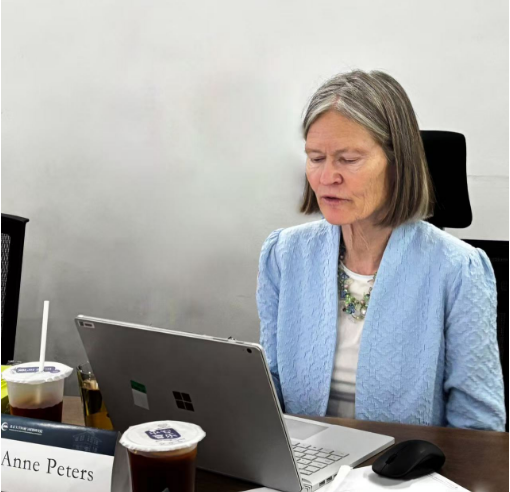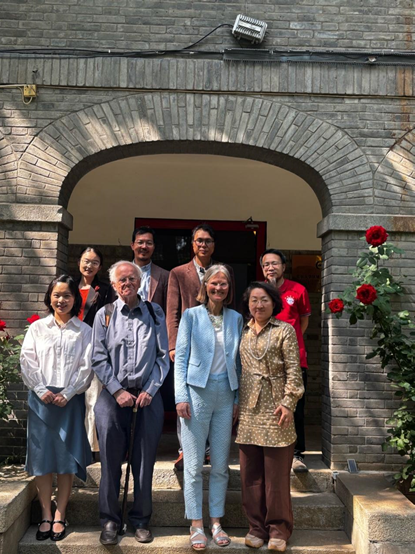
The 51th lecture of the “Adventus Amicorum” salon series was held on May 15, 2025, by the Institute of Area Studies, Peking University (PKUIAS), during which Prof. Anne Peters, director of the Max Planck Institute for Comparative Public Law and International Law, Heidelberg (Germany), shared her thoughts on the topic, “The International Legal Order in Times of Turbulence.” The lecture was moderated by Zhang Yongle, deputy director of PKUIAS. Other participants included Zhao Hong and Li Honghai, both professors at the Law School, PKU; Anthony Carty, a visiting professor at the Law School, PKU; Liu Haifang, an associate professor at the School of International Relations, PKU; Chen Yifeng, an associate professor at the Law School, PKU; and Lai Huaxia, an assistant professor at the School of International Relations, PKU.
Peters developed her presentation from four aspects, analyzed the challenges and transformation trends faced by international law in today’s turbulent situation from multiple dimensions, and proposed countermeasures for scholars. She first pointed out that the current international legal order was facing a destructive trend, which had manifested itself in different ways, such as legal but corrosive action, deviation from international law, violation of general rules, and systemic opposition to or complete departure from international law. At the same time, international law still shows resilience, shown by the signing of new treaties such as the “Agreement on Marine Biodiversity in Areas Beyond National Jurisdiction,” the rise of global public interest litigation, and the emergence of alternative dispute resolution mechanisms.
Based on this, Peters argued that the current international order was undergoing transformation rather than collapse. On the one hand, the digital revolution, climate crisis and resource competition, and nationalist and populist ideologies have brought new challenges to international law, and the international power structure is changing. On the other hand, the characteristics of the international order are gradually shifting from multilateralism to a more “transactional” international legal order, and international law is being instrumentalized.
Finally, Peters pointed out that in the face of difficulties, scholars had an important role and mission. As international law scholars, they should first reject legal nihilism, criticize the “hegemonic instrumentalism” of international law, and avoid the attitude that “law is useless” caused by excessive criticism. At the same time, they should adopt a critical path that combines internal and external factors: on the one hand, clarifying the application of law from a doctrinal perspective to avoid falling into “pure political criticism,” and, on the other hand, combining sociological and anthropological perspectives to reconstruct legal benchmarks with “embedded humanism.” Furthermore, scholars should pay more attention to cross-civilizational and multi-perspective research, promote “cross-civilizational dialogue,” and oppose “Western-centrist” narratives.

In the discussion session, Zhao Hong pointed out that the “selective compliance” with international law by major powers was the primary threat, particularly as the US’s self-negation as an “order creator” exacerbated the chaos. She stated that the contributions of the Global South would be key to balancing the future order. She also noted that current international law methodology was confined to Western doctrinal studies and should incorporate a “cross-civilizational perspective” to construct “bottom-up” universal rules.
Liu Haifang approached the issue from the perspective of the Global South, pointing out that economic development and international support were crucial for Global South countries to uphold international law. She called for a new international order that affirmed the contributions of the Global South. Simultaneously, she advocated for considering what kind of dialogical foundation could be provided for young scholars in an educational sense.
Lai Huaxia argued that contemporary international law writing should extend the temporal scale to the beginning of globalization in the 17th century to understand the phased nature of the Western-dominated order more objectively. She also suggested learning from “global history” methods to emphasize the contributions of marginalized states to international law and reflect on the “core–periphery” narrative. Furthermore, she noted that different civilizations had divergent ways of understanding the world and vastly different collective memories of history and international law; clarifying these divergences and seeking consensus required extensive cooperation among scholars and across disciplines.
Li Honghai, drawing a comparison between international law and domestic law, proposed that international law without enforcement was meaningless. Therefore, he suggested starting with specific fields to undertake beneficial remedial attempts to enhance the enforceability of international law.
Chen Yifeng engaged in the discussion on three aspects: how Europe’s image in international public law maintains its global effectiveness, the new political foundations facing international law, and the interdisciplinary narrative of international law.
Anthony Carty, starting from current international conflicts, criticized the hypocrisy of international law. He argued that transcending the language of international law and introducing bottom-up debates across civilizations was a radical but feasible solution.
After Prof. Peters thoroughly addressed the experts’ comments and questions, the seminar concluded to resounding applause.


